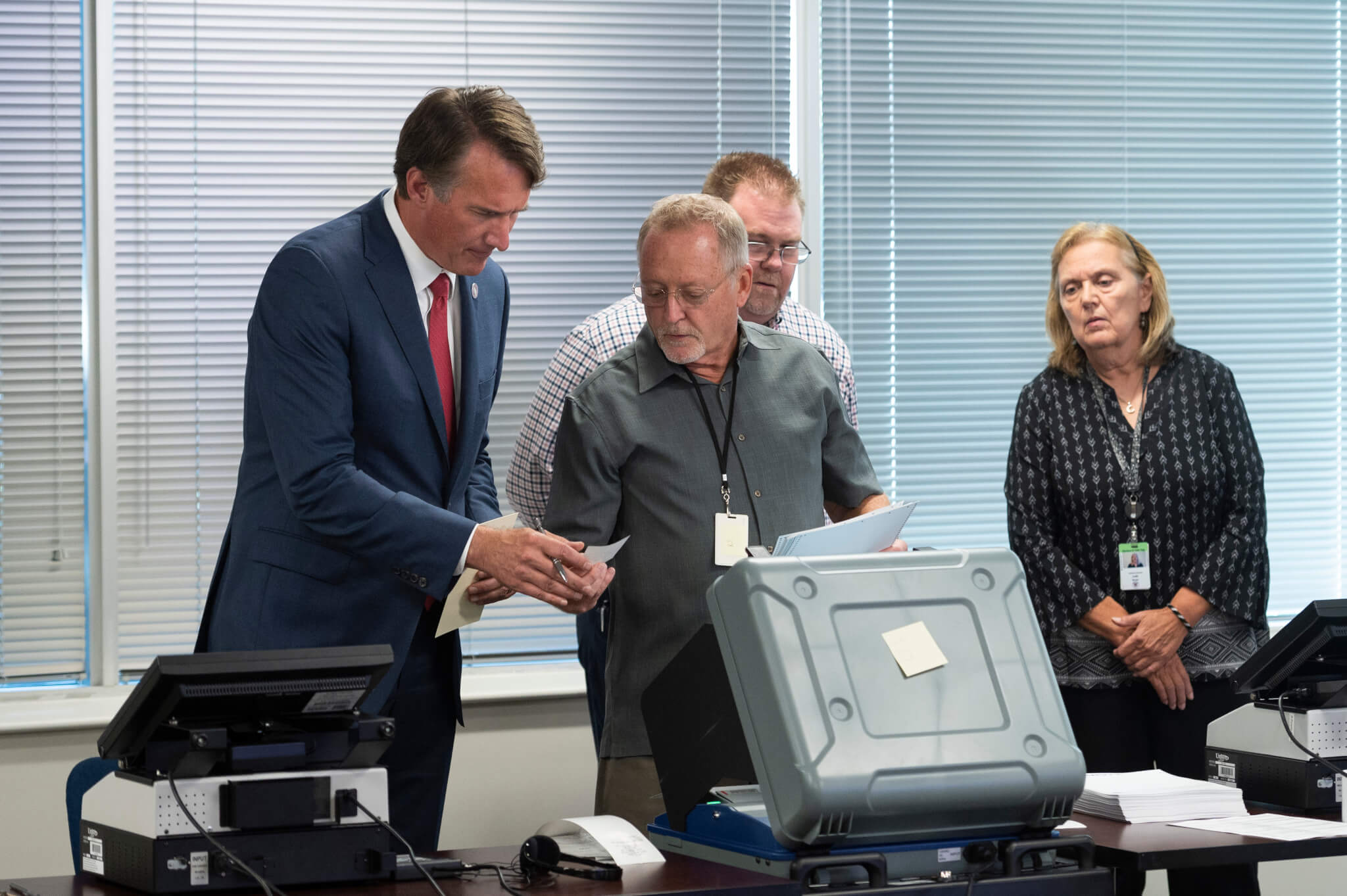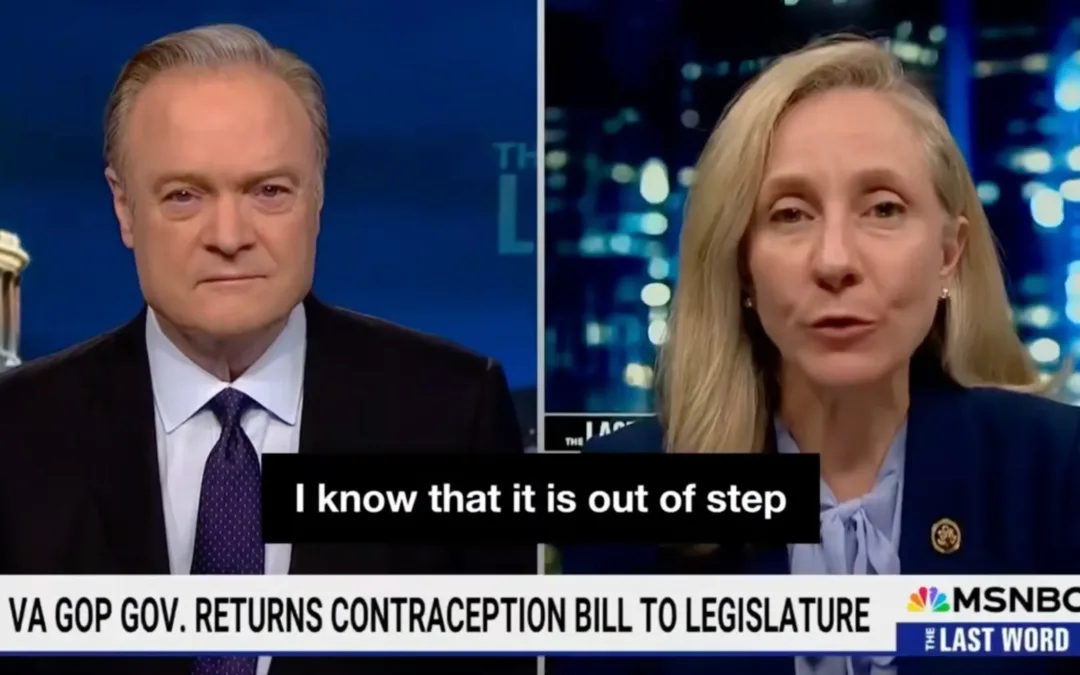
FILE - Virginia Gov. Glenn Youngkin is shown a voter receipt slip while touring the Loudoun County County Office of Elections, in Leesburg, Va., Sept. 20, 2022. Election officials in Virginia have announced plans to withdraw the state from a bipartisan effort aimed at ensuring accurate voter lists and combating fraud that has been ensnared in conspiracy theories that have erupted since the 2020 presidential election. (AP Photo/Cliff Owen, File)
Despite being one of the seven founding states of the Electronic Registration Information Center, Virginia’s top election official has announced that the commonwealth would be withdrawing from the bipartisan, multistate partnership originally founded in 2012.
Virginia’s Republican-led government has withdrawn from an effort designed to ensure election integrity and combat voter fraud, a move that comes after some party members have spent two years denying the outcome of the 2020 election and amplifying voting-related conspiracy theories.
Earlier this month, top Youngkin administration election official Susan Beals announced that Virginia would be withdrawing from a bipartisan, multistate partnership known as the Electronic Registration Information Center (ERIC).
Originally founded in 2012, ERIC is a non-profit organization that has grown over the years to include 33 states, as well as Washington, D.C. It was created to help states improve the accuracy of their voter rolls and to help increase voter registration access for all citizens.
At the time, Republican Gov. Bob McDonnell helped promote the bipartisan effort to safely share data related to elections, as well as better maintain accurate voter rolls.
States using the system securely submit voter registration data, and Department of Motor Vehicles records are merged with the federal death and postal service address data to give a broader, more comprehensive look at who is eligible to vote and identifying people who have moved between states or died. Reports are then provided to member states to help identify inaccuracies or out-of-date voter registration information.
Due to its thorough nature, ERIC has been praised as one of the strongest tools the nation has to combat voter fraud. But the program has become an increasingly controversial one among Republicans and right-wing activists.
Virginia is the latest Republican-led state to announce withdrawal from the program, following Alabama, Florida, Iowa, Louisiana, Missouri, Ohio, and West Virginia. Texas is another Republican-led state that has considered withdrawing, but has not formally left the program.
The GOP-led Department of Elections in the commonwealth opted to withdraw from the program over concerns about privacy and costs, as well as a risk of data being shared with outside organizations that could be “leveraged for political purposes.”
As laid out in the system’s frequently asked questions, ERIC is a 501(c)(3) that is “prohibited from directly or indirectly participating in, or intervening in, any political campaign on behalf of (or in opposition to) any candidate for elective public office.”
ERIC is also not connected to any individual state’s voter registration system. Member states have complete control over their voter rolls.
The ERIC system has had bipartisan support for years, leading Virginia Democrats to criticize the Youngkin administration’s move to leave.
In a press conference held on May 15, prominent Virginia Democrats spoke out against the decision, noting that it’s the “subject of lies and conspiracy theories from MAGA Republicans.”
“Ever since Donald Trump and MAGA Republicans began spreading lies and misinformation about the 2020 election, the Electronic Registration Information Center, and therefore our election integrity, has come under attack. Now Republican leaders including Glenn Youngkin are buying into Trump’s lies and conspiracy theories and pulling out of this interstate agreement, weakening our election systems and democracy,” Sen. Mamie Locke said.
House Minority Leader Don Scott Jr. questioned why Republicans would want to do away with the program after all this time.
“The answer is and always has been clear since Gov. Youngkin was elected — because they want to undermine our democracy.”
During the press conference, Del. Marcus Simon said that the attacks on the ERIC system had come from “the original ‘Big Lie,’” referring to the 2020 election.
“It’s clear that here in Virginia, our Republican leaders are buying into Trump’s lies; they are buying the big lie [and] running with it. They’re making policy based on it,” he said.
Politics

VIDEO: Rep. Abigail Spanberger speaks on right to contraception bill veto
Rep. Abigail Spanberger (D-Va.) criticized Youngkin’s refusal to sign a bill that would have given Virginians a legal right to contraception, saying...

Spanberger calls Youngkin’s refusal to sign birth control access bill ‘outrageous’
Spanberger criticized Youngkin’s refusal to sign a bill that would have given Virginians a legal right to contraception, saying the move follows the...
Local News

Southside woman keeps the arts alive through community theatre
Katelyn Murray, a financial planner from the Danville area, grew up on stage. “I have been dancing since I was three, up through 23. I've been...

Virginia’s Homegrown Stars Had Big Moments in 2023
Although such celebrity meccas as New York and California may come to mind when you think of famous people, Virginia also has its fair share of...





